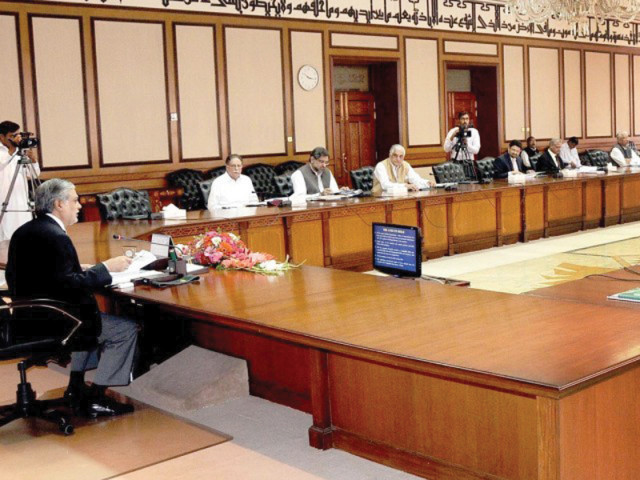ECC – a political tool for successive govts
Committee’s decisions benefit selected groups at the cost of consumers.

The Economic Coordination Committee (ECC) of the cabinet – a body set up to take economic and financial decisions – has become a political tool. It is utilised for extending benefits to selected groups, often by compromising the fundamentals of economics.
The tradition of using the ECC to dole out taxpayers’ money to vested interests reached a peak in the last year of the previous Pakistan Peoples Party (PPP) government. A few months before the elections, PPP’s finance minister regularly called ECC meetings and approved summaries on the directives of the then top man of the country.

With the change in government in June last year, hopes arose that the PML-N administration would discontinue the practice of using the treasury to offer benefits or stop utilising the ECC’s platform to reward its voters.
From July 2013 to June 2014, the cabinet committee took decisions, which were by and large defendable. However, the trend reversed in the past six months, particularly after the start of protest rallies by the opposition Pakistan Tehreek-e-Insaf.
In the six months, the ECC provided over Rs38 billion worth of benefits to the agriculture sector. It also appeased the industrialists by promising gas and electricity supplies during winter in violation of the energy distribution policy and the priority list.
However, in an effort to ensure transparency in decision-making, Finance Minister Ishaq Dar outlined measures, prominent among them were seeking the feedback of the ministries concerned before sending a summary to the ECC and highlighting the sources of funding if there was no allocation in the budget.
Dar also gave directives that the ministries should submit their summaries well in advance along with necessary background information.
Instructions flouted
But a critical look at the decisions taken by the ECC shows a clear violation. In a latest but one of the most objectionable decisions taken by the government, the ECC sanctioned a subsidy of Rs10 per kg on sugar exports including an inland freight subsidy of Rs2 per kg and cash subsidy of Rs8 per kg. The subsidy bill will eat up Rs6.5 billion from the national exchequer.

The clear beneficiaries will be the all-powerful sugar barons, who also represent the ruling party. The losers are the consumers who despite a fall in prices in the global market will be paying higher rates.
In the international market, the sugar price is Rs39 per kg whereas in the domestic market it is in the range of Rs55 to Rs60 per kg.
The decision is also against the free market dynamics where supply and demand determine the price of a good.
The ECC also imposed a 20% regulatory duty on the import of raw and beet sugar aimed at discouraging its cheap imports. Earlier, the cabinet committee endorsed a summary prepared to compensate the farmers of basmati rice with cash payments of Rs5,000 per acre. The government will bear a subsidy of Rs10 billion on this account, which has not been provided in the budget.
The move came in the wake of a significant decline in rice prices this year and pressure from the agricultural lobby, led by the Minister for Food, National Security and Research Sikandar Hayat Bosan.
The third decision that raised eyebrows was the provision of subsidy on agricultural tube wells. On a proposal of the Ministry of Water and Power, the ECC agreed on providing Rs10.35 per unit of electricity until June next year. On this account, the federal government will release Rs22 billion, again an allocation which has not been covered in the budget.
Provincial domain
Finance Minister Dar, who is also the ECC chairman, also approved the wheat support price at Rs1,300 per 40 kg for the 2014-15 crop. However, the determination of crop prices is a provincial subject after the 18th Amendment to the Constitution.
For cotton of base grade 3, the ECC set the support price at Rs3,000 per 40 kg in a bid to stabilise prices in the domestic market, which were going down after a plunge in the global market. In response to a summary sent by the Ministry of Textile Industry, the ECC agreed on ensuring electricity and gas supplies to the textile sector. This came at the cost of domestic consumers, who were facing continuous outages.
This all underscores the need for restoring the ECC’s credibility in order to ensure that markets are not manipulated for providing benefits to selected groups. At present, the committee looks like a representative body of different lobbies and the nation, particularly people, eventually suffers.
The writer is a staff correspondent
Published in The Express Tribune, December 29th, 2014.
Like Business on Facebook, follow @TribuneBiz on Twitter to stay informed and join in the conversation.



















COMMENTS
Comments are moderated and generally will be posted if they are on-topic and not abusive.
For more information, please see our Comments FAQ